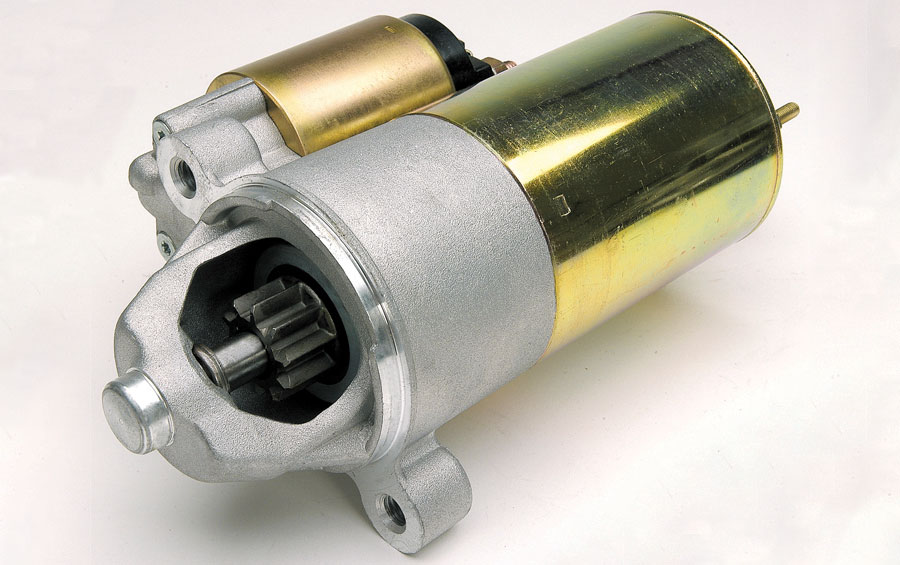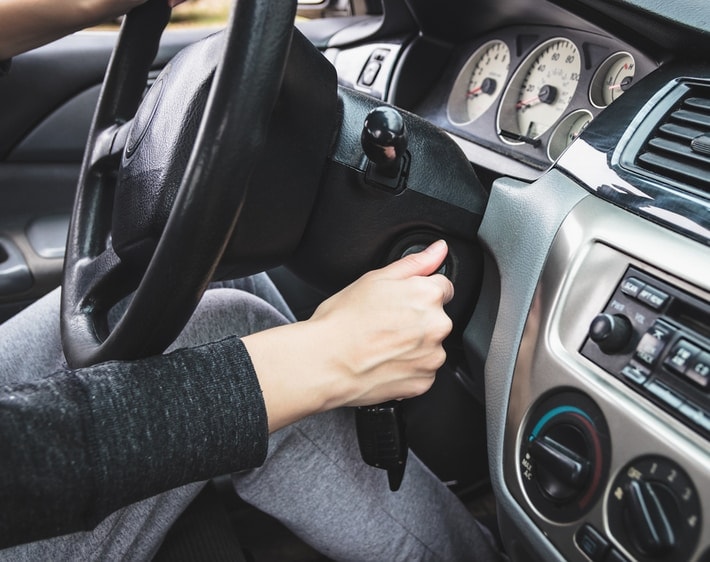A bad starter can be determined by slow cranking or no cranking sound at all when trying to start the engine. If your vehicle has difficulty starting or you hear no sound when turning the key, it’s likely that the starter is bad.
The starter is responsible for initiating the engine’s combustion process, and any issues with it can prevent the engine from starting. Signs of a bad starter often include a slow cranking sound or no sound at all when attempting to start the vehicle.
We will explore the common symptoms of a bad starter, discuss the potential causes, and provide some tips on how to diagnose and repair this issue.

Credit: www.autozone.com
Signs Of A Bad Starter
Is your car refusing to start? If you’re experiencing difficulties starting your vehicle, it may be a sign of a bad starter. The starter is a crucial component in your car’s electrical system, responsible for initiating the engine’s rotation. Over time, starters can wear out and fail, leading to frustrating starting issues. By keeping an eye out for a few key signs, you can quickly identify if your starter needs replacement, saving you time and potential headaches in the future.
Grinding Noise
One of the most noticeable signs of a bad starter is a grinding noise when you attempt to start your car. This sound can often be described as a harsh metallic or grinding noise that occurs as the starter motor tries to engage with the flywheel. If you hear this noise, it is essential to address the issue promptly as ignoring it can cause further damage to the flywheel. Ignoring a grinding noise may eventually lead to a costly repair bill, as you may need to replace not only the starter but also the flywheel.
Clicking Sound
Another common sign of a bad starter is a clicking sound when you turn the key or press the start button. This clicking sound usually comes from the starter solenoid, a small electromagnet that controls the flow of electricity to the starter motor. When the solenoid becomes worn out or damaged, it may fail to deliver enough current to the starter motor, resulting in repeated clicking sounds. If you hear this clicking sound and your car doesn’t start, it’s likely an indication that your starter needs attention.
If you’re experiencing these signs of a bad starter, it’s best to consult with a professional mechanic to diagnose and fix the issue. Attempting to address the problem yourself without proper knowledge and tools can lead to further damage and expensive repairs. By seeking expert help, you can ensure a quick and efficient resolution to your starting issues.

Credit: www.theperfectloaf.com
Symptoms Of A Bad Starter
A bad starter can cause a range of issues in your vehicle, making it difficult or impossible to start the engine. Identifying the symptoms of a bad starter can save you time and money on unnecessary repairs. If you notice any of the following signs, it may be an indication that your starter requires attention. Read on to learn more about the symptoms of a bad starter and how to troubleshoot them.
Intermittent Starting
One of the most common symptoms of a bad starter is intermittent starting. This means that sometimes your vehicle starts up fine, while other times it struggles to start or doesn’t start at all. You may hear a clicking sound when turning the ignition key, but the engine fails to respond. This inconsistency in starting could be a sign of a worn-out or failing starter motor. If you experience this issue, it’s best to have your starter inspected by a professional mechanic.
Engine Cranks Slowly
If you notice that your engine cranks slowly or takes longer than usual to start, it may indicate a faulty starter. When the starter motor begins to wear out, it can’t generate enough power to turn the engine over at the regular speed. As a result, you may hear a grinding noise or notice a delay in the engine’s response. It’s important to address this issue promptly, as a failing starter can lead to more significant problems if left unattended.
Other Signs To Look Out For
- Unusual noises: A bad starter can produce grinding or screeching sounds when trying to start the engine.
- Burning smell: If you smell a burning odor when attempting to start the car, it could indicate an electrical issue with the starter.
- Dashboard lights: Pay attention to any warning lights that illuminate on your dashboard, as they may indicate a problem with the starter or other electrical components.
- Electrical issues: A faulty starter can cause electrical malfunctions, such as flickering headlights or dimmed interior lights.
Keep in mind that while these symptoms are commonly associated with a bad starter, they can also be indicative of other problems in your vehicle’s electrical system. It’s advisable to consult a professional mechanic to accurately diagnose and resolve any issues with your starter.
Diagnosing A Faulty Starter
Diagnosing a Faulty Starter is an essential skill for any car owner. When your car refuses to start, it’s often the first sign that something might be wrong with the starter. Various factors can contribute to a faulty starter, including a weak battery or a malfunctioning ignition switch. Understanding how to check these components can save you time and money in diagnostic and repair costs.
Check The Battery
One of the primary reasons why a car starter may fail is due to a weak or depleted battery. A simple way to check the battery’s condition is by using a multimeter to measure the voltage. A healthy battery should ideally show around 12.6 volts. Anything lower than 12 volts could indicate a problem.
Inspect The Ignition Switch
The ignition switch is another vital component to inspect when diagnosing a faulty starter. This switch serves as the primary point of contact between the battery and the starter motor. A faulty ignition switch can prevent the starter from receiving the necessary power to start the engine. Look for signs of wear and tear or loose connections that may disrupt the electrical flow.
Fixing A Bad Starter
When your starter is giving you trouble, it can be frustrating. But there are some steps you can take to fix a bad starter and get your vehicle back on the road.
Replace The Starter Motor
If your starter motor is malfunctioning, it may need to be replaced. Here are the basic steps to replace a faulty starter motor:
- Disconnect the battery cables
- Remove the old starter motor
- Install the new starter motor
- Reconnect the battery cables
Check The Solenoid
The solenoid is another part of the starter system that can cause issues when it fails. Follow these steps to check the solenoid:
- Visually inspect the solenoid for any signs of damage
- Test the solenoid with a multimeter to check for continuity
- If the solenoid is faulty, replace it with a new one
By following these steps, you can troubleshoot and fix a bad starter to ensure your vehicle starts smoothly every time.
Preventive Measures
Preventive measures play a vital role in ensuring the longevity of your car’s starter. Implementing the following measures can help you prevent potential starter issues.
Regular Maintenance
Regular maintenance is crucial for keeping your car starter in optimal condition. Conduct routine checks to identify and address any potential issues early on.
Using Quality Parts
Quality parts are essential for the smooth operation of your starter. Ensure you use genuine parts to enhance the performance and durability of your car’s starter.

Credit: www.firestonecompleteautocare.com
Frequently Asked Questions Of How To Know Starter Is Bad
What Are The Symptoms Of A Bad Starter?
Common symptoms of a bad starter include the engine making grinding or whirring noise, failing to start, and fumes. Additionally, you may experience a slow cranking sound and dashboard warning lights flickering. If you encounter these signs, it’s advisable to have your starter checked by a professional mechanic.
How Can You Test If A Starter Is Bad?
To test if a starter is bad, you can perform a voltage test or a physical inspection. Check for any loose connections or signs of damage. You can also try jump-starting the vehicle or listening for a clicking sound when you turn the key.
Consider consulting a mechanic for a professional diagnosis.
Can You Jump Start A Car With A Bad Starter?
Yes, you can jump start a car with a bad starter. By connecting a working car’s battery to the dead car’s battery, you can provide temporary power to the starter. However, it is recommended to get the bad starter fixed as soon as possible.
How Do I Know When My Starter Needs Replacing?
You can tell your starter needs replacing if your engine struggles to start or makes strange noises. If the dashboard light for the starter comes on, that’s also a sign. Pay attention to any warning signs, and have a professional mechanic inspect it for safety.
Conclusion
Knowing when a starter is bad is crucial for maintaining a vehicle’s performance. By understanding the signs and being proactive, you can avoid being stranded without warning. Regular maintenance and addressing issues promptly can save you time and money in the long run.
Stay informed and attentive to your car’s needs.